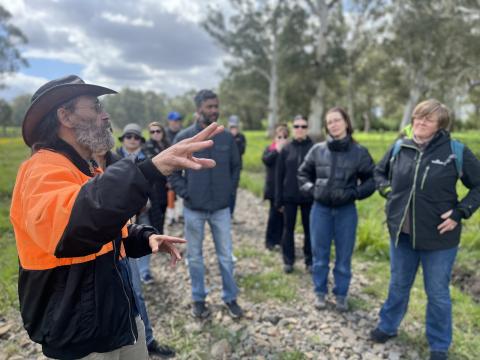


I’m happy to be writing to you this National Reconciliation Week with some exciting updates on our historic and continuing support of Reconciliation at Natural Hazards Research Australia (the Centre).
I joined the Centre in July 2023, fortunate to have had several opportunities to work with and learn from First Nations communities in my previous roles. In October 2023, I assumed the role of Chair of the Reconciliation Action Plan Working Group (RAPWG), after the amazing former Chair, Beth Patch, moved onto Fire to Flourish. I am reporting the successes and lessons learned from the Centre’s Reflect Reconciliation Action Plan (RAP), which concluded in December 2023. However, given I had only been a member of the Centre for five months, and the RAPWG for two at that stage, the credit goes to Beth and the longstanding and former members of the RAPWG listed below, not to mention the staff and researchers who were involved from the beginning. The Centre committed to achieving 63 deliverables designed to support Reconciliation when it launched its Reflect RAP in July 2022. By the end of the Reflect RAP we had fully completed 89% of these with only seven deliverables remaining partially complete.
These figures provide a glimpse, but they don’t convey the story of the great work the Centre is doing, how ambitious our Reflect RAP was and the impact of achieving many of those ambitions.
Every RAP has targets to ensure businesses are consistently seeking to engage First Nations led suppliers in their work and the Centre can be proud to claim that over the course of the Reflect RAP we committed more than $2 million to First Nations-related natural hazards research. The amount is significant but doesn’t capture the intent or the impact which is aimed at supporting the resilience of First Nations communities, recognising the leadership of First Nations community members and emergency management volunteers and workers, while recognising we have a great deal to learn about resilience from the longest living culture on the planet.
Through these projects and the Reflect RAP we have been able to support:

Image: Uncle Dave (left) speaking to Centre staff at Corranderk.
It’s crucial to recognise the passion and commitment of the exceptional Reconciliation Working Group members we’ve had over the course of the Reflect RAP. We’d like to thank all people mentioned below for their time, generosity and wisdom in helping develop and deliver a RAP which has stretched the Centre’s ambitions in supporting the inclusion and rights of First Nations peoples:
We would also like to extend our thanks to all the researchers and staff that have been so dedicated in delivering the Reflect RAP.
Natural Hazards Research Australia are committed to building on the successes by:
I became the Chair of the Reconciliation Action Plan Working Group the Monday after the Voice referendum in October 2023. It was, and continues to be, an extremely challenging time for many Aboriginal and Torres Strait Islander colleagues and friends.
The membership of the working group changed extensively during that time, and as a group we reflected on what Reconciliation means post-Referendum. We concluded that the Referendum had underscored the need for organisations like the Centre, which are uniquely positioned to make considerable contributions towards Reconciliation, to step up and be clear on the outcomes we are trying to achieve with First Nations peoples. This has inspired the move to develop a strategy to shape and articulate our commitments to supporting Reconciliation through our work. I believe it perfectly captures the theme of this year’s Reconciliation Week: Now More Than Ever. We will keep you informed as this work progresses.